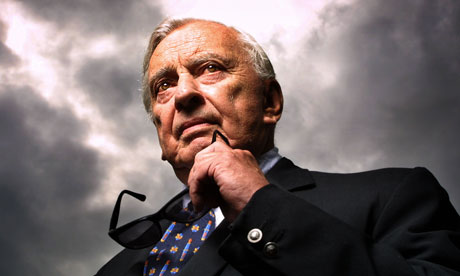
When I interviewed Gore Vidal in 2008, he was already in what he referred to as the "Cedars-Sinai years". Confined to a wheelchair, he descended to his Hollywood drawing room in a lift, helped by his major domo, Norberto, who was wearing – I have never been able to forget this – surgical gloves. It was an indelible moment, at once thrilling and terrifying. The room was straight out of Sunset Boulevard, every surface covered with photographs of the young Gore with famous friends and relatives: Vonnegut and Mailer, JFK and Jackie O. The net curtains, as I later wrote, looked as though they had been dipped in weak tea. As for my interviewee, once so extraordinarily beautiful, he looked desperately frail, the skin grey, and the eyes yellow. But the voice. Ah, the voice. That was exactly as it had always been: as cold and as dry as a well made martini. His first words, as he moved, slowly and inexorably towards me, were: "The approach is difficult… the retreat desirable."
There followed one of the most extraordinary encounters of my professional life. Some people can talk for hours, and never say anything interesting. Gore Vidal talked to me for 40 minutes – he finally dismissed me by fixing his eyes on a point beyond my left shoulder, and falling silent – and every word was electric. We talked about Hillary Clinton ("This worry that she's unlikable. Every politician is unlikable") and George Bush ("Wise people don't use the word fascist any more. But they [the Republicans] are totalitarian-minded"). We talked about JFK ("I miss him. He was the greatest gossip who ever lived") and Christopher Hitchens ("These people, these foreigners. They wander in, read one issue of Rolling Stone, and they think they know everything about it [America]"). No, he had not softened with old age. Not for him a late bid for the title National Treasure. His compatriots, he told me, were dumb, and boring: "Who feels flattered by their attack?" He did a wonderful impression of Truman Capote, a man he truly hated.
"Everyone's dying," he said, waving a gracious hand in the direction of the photograph of Mailer and Vonnegut. Of course, Mailer's hard-man act was just that: a performance. I wondered aloud – though I already knew the answer – whether his own coldness, a glacial disdain that could freeze a man's innards from 100 paces, was a similar act. Certainly not. "They don't know how chilly I am!" he said, his voice rising for the first time. Did he hate being old? "No." Silence. Nevertheless, he admitted to having cultivated several human "godsends" over the years, on whom he now relied for support. Among these were his seven godchildren. That's quite a few, I said. "Yes." A delicious pause. "Always a godfather, never a god."

